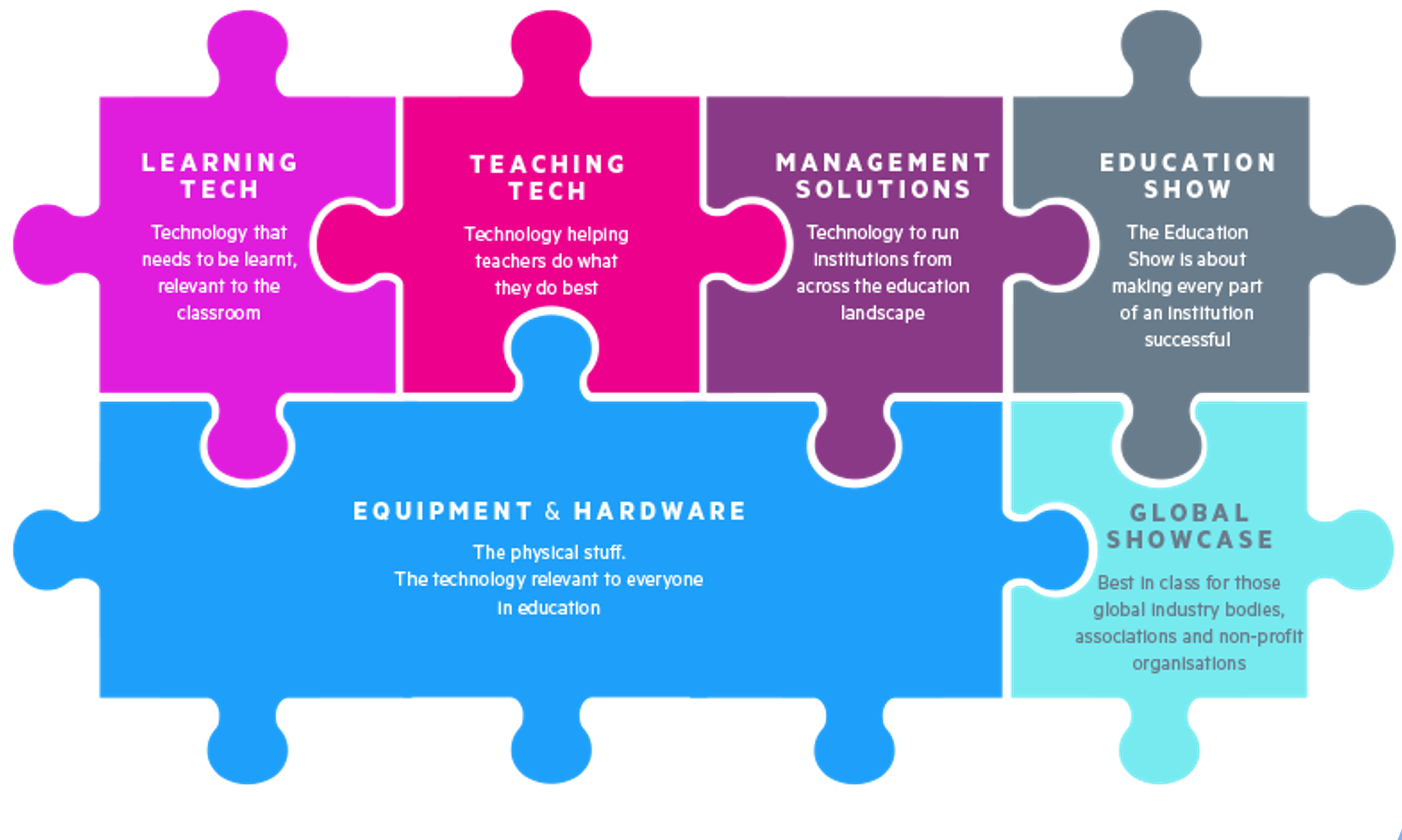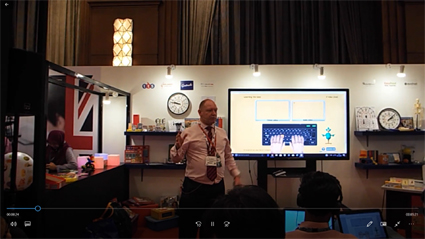Many assistive technology companies have already decided that the Bett Show is no longer on their radar but we are promised that Inclusion, Social Mobility and SEND will be one of six content themes for Bett 2020. So, is it worth a visit?

Held at ExCeL London every January, Bett was one of the key events in the technology calendar but in recent years there has been little evidence of disability and assistive technology exhibitors. There used to be a Special Needs Village and a Fringe but these have long gone. Critics feel that technology that levels the playing field for those with physical disabilities or offers extra support for those with dyslexia or helps people with mental health issues secure and continue in a job has been so ‘integrated’ into the show that it is now invisible.
So is it worth attending Bett 2020? Ieva Stuikyte said: ‘In 2019 we had over 180 SEN specialists attending Bett so for SEND companies in attendance this can be an effective way of getting in front of key influencers and decision-makers.’
At present there are several ways for companies to benefit from Bett:
- Companies that choose not to exhibit at Bett this year can set-up meetings with relevant attendees via Connect@Bett, a facilitated meeting tool that can provide a cost-effective way of networking
- BESA members who are new to Bett, or haven’t participated in the past two years, can join the BESA Pavilion where they can exhibit in a plug-and-play pod and speak in the workshop area each day of the show
- All BESA members can benefit from a 5% discount on any stand at the show
- EdTech start-ups can join Bett Futures, a start-up zone with plug-and-play stand options as well as peer networking and support in the months leading up to Bett
Networking and finding customers
- Five solution zones at Bett 2020 to help attendees connect with relevant suppliers
- SEND will feature in each of these zones
- A Leaders’ programme to help buyers and decision-makers ‘find the solutions, ideas and contacts they need’
- Two new Professional Development theatres offering free CPD to educators at all levels
- Bett is partnering with the Global EdTech Start-Up Awards in 2020 and all start-ups and Bett Exhibitors can attend the awards in the Arena on the Thursday evening at no cost.
- This could be a good networking opportunity.
 Often schools look for clubs as an antidote to technology promoting outdoor pursuits and a break from screen time. All good arguments but there is still a place for learning touch typing.
Often schools look for clubs as an antidote to technology promoting outdoor pursuits and a break from screen time. All good arguments but there is still a place for learning touch typing. The children I was working with at the time were very enthused by it, especially being able to challenge each other with their typing speeds. Many were also partly motivated by the fact that I had set them a personal challenge to exceed my typing speed.
The children I was working with at the time were very enthused by it, especially being able to challenge each other with their typing speeds. Many were also partly motivated by the fact that I had set them a personal challenge to exceed my typing speed. in England, Wales, Northern Ireland and Scotland including Seaview Primary School in Belfast, Ysgol Gyfun Gymraeg Bro Edern in Cardiff, and Acklam Grange Teaching School in Middlesborough. These pioneering schools, and others, will be helping to launch Edtech50 Schools and to spread the word across the whole of UK.
in England, Wales, Northern Ireland and Scotland including Seaview Primary School in Belfast, Ysgol Gyfun Gymraeg Bro Edern in Cardiff, and Acklam Grange Teaching School in Middlesborough. These pioneering schools, and others, will be helping to launch Edtech50 Schools and to spread the word across the whole of UK. Goddard said: “It is a key moment for edtech. Earlier this year, the Secretary of State for Education was clear that the power of technology could provide significant support to help students learn, reduce teachers’ workload and save money. There is great potential for edtech to help make a difference but it needs to be the right technology, implemented effectively, and with good support for staff. The Edtech 50 wants to shine a spotlight on the schools leading the way, which we hope can inspire other schools.â€
Goddard said: “It is a key moment for edtech. Earlier this year, the Secretary of State for Education was clear that the power of technology could provide significant support to help students learn, reduce teachers’ workload and save money. There is great potential for edtech to help make a difference but it needs to be the right technology, implemented effectively, and with good support for staff. The Edtech 50 wants to shine a spotlight on the schools leading the way, which we hope can inspire other schools.â€ Mark Anderson said: “I work with schools daily to help them get the very best they can from the edtech they have access to. The Edtech 50 Schools tour is about shining a spotlight on the schools in the UK that are doing amazing things every day to support, enhance and transform teaching and learning with technology to help children get the very best out of our education system.â€
Mark Anderson said: “I work with schools daily to help them get the very best they can from the edtech they have access to. The Edtech 50 Schools tour is about shining a spotlight on the schools in the UK that are doing amazing things every day to support, enhance and transform teaching and learning with technology to help children get the very best out of our education system.â€ I have always thought I was quite a nice person but I have just discovered I’m reliable, supportive and cynical. This news was brought to me courtesy of a press release from STABILO and discovered a little about the dark art of graphology.
I have always thought I was quite a nice person but I have just discovered I’m reliable, supportive and cynical. This news was brought to me courtesy of a press release from STABILO and discovered a little about the dark art of graphology.

 The Education Show is a firm favourite with many teachers in the midlands and north of England and, sitting alongside Birmingham airport, it attracts staff from Ireland and Europe as well. It offers schools everything from pencils and stickers to high cost technology and is increasingly popular as a source of professional development. Those responsible for special needs will appreciate having time to catch up with the latest products and enjoy some first-rate free training in the Early Years and SEN Theatre.
The Education Show is a firm favourite with many teachers in the midlands and north of England and, sitting alongside Birmingham airport, it attracts staff from Ireland and Europe as well. It offers schools everything from pencils and stickers to high cost technology and is increasingly popular as a source of professional development. Those responsible for special needs will appreciate having time to catch up with the latest products and enjoy some first-rate free training in the Early Years and SEN Theatre. Glyndwr University, will be talking about Supporting Mental Health in Schools: Counselling Skills and Therapeutic Play Skills Training. (Thursday 16 March, at 3.10pm). It is not only children who struggle; Robert Whitelock, teacher of mathematics at Garforth Academy, claims that 1 in 4 school staff are likely to suffer from mental health issues. With increasing numbers of staff absent through stress it would be a good idea for senior leaders to attend Managing Mental Health – A Resilience Toolkit, at 10.40am Saturday 18th March.
Glyndwr University, will be talking about Supporting Mental Health in Schools: Counselling Skills and Therapeutic Play Skills Training. (Thursday 16 March, at 3.10pm). It is not only children who struggle; Robert Whitelock, teacher of mathematics at Garforth Academy, claims that 1 in 4 school staff are likely to suffer from mental health issues. With increasing numbers of staff absent through stress it would be a good idea for senior leaders to attend Managing Mental Health – A Resilience Toolkit, at 10.40am Saturday 18th March. lds, with more than 2.2 million weekly readers on stand N87
lds, with more than 2.2 million weekly readers on stand N87 Last month the HelpKidzLearn development team received the 2016 Education Resource Award for Special Educational Needs including ICT for their work on harnessing
Last month the HelpKidzLearn development team received the 2016 Education Resource Award for Special Educational Needs including ICT for their work on harnessing 
 here is loads of good stuff for people with dyslexia: Debra Charles is doing one of the keynotes. She is
here is loads of good stuff for people with dyslexia: Debra Charles is doing one of the keynotes. She is As someone who uses Autocorrect on Word and types entirely in abbreviations, I am keen to see Global AutoCorrect which works with all programs from presentation software to emails, the web and social media. It frustrates me when I have to type every letter on Facebook. Maybe now I won’t have to.
As someone who uses Autocorrect on Word and types entirely in abbreviations, I am keen to see Global AutoCorrect which works with all programs from presentation software to emails, the web and social media. It frustrates me when I have to type every letter on Facebook. Maybe now I won’t have to.